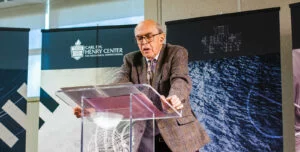Think of your favorite scientist or theologian. Now imagine: what hymn would you want sung at their funeral, because you knew it was their favorite hymn?
At the funeral of the Swiss biblical scholar Adolf Schlatter (born 1852) on May 23, 1938, the large crowd assembled in the Tübingen municipal cemetery sang Schönster Herr Jesu—“Fairest Lord Jesus.” This hymn (Schlatter’s favorite) celebrates Jesus as “Lord of all nature” and refers to nature’s beauty—the meadows, the woodlands, the sunshine, “all the twinkling starry host”—as the springboard to affirming Jesus’ all-transcending glory.
Speaking at Schlatter’s burial, the Lutheran bishop Theophil Wurm noted that Schlatter had upheld in all his scholarship the truth of Scripture. But in doing so he avoided a biblicism isolating itself from the concerns of both church and science. Schlatter preserved the connection between historical and theological study, on the one hand, and the natural sciences, on the other, Wurm affirmed. In a time when Adolf Hitler was growing more ominous by the day as Führer (leader) to destruction, another speaker at the burial noted, “For me personally and for many of my coworkers, Schlatter was a Führer who brought us to Christ.”For a summary of the burial proceedings see Werner Neuer, Adolf Schlatter. Ein Leben für Theologie und Kirche (Stuttgart: Calwer, 1996), 819-820.
What can we learn from this figure with a reputation for such a high view of both theological and scientific endeavor?
Schlatter’s Life: Its Scientific Focus
Schlatter’s life was marked positively by his upbringing. He inherited his pharmacist father’s deep love for the native Alpine flora and fauna that surrounded him growing up in St. Gallen, Switzerland.Ibid., 11-13. Years later, toRealizing that for him, to flee critical study of theology amounted to abandonment of serious faith, Schlatter opted to pursue theological scholarship. vary his usual Bible lessons at the Tübingen YMCA which he led from 1912–1919, he gave learned talks on wonders of the plant world.Ibid., 543.
Adept at languages, Schlatter determined as a young teen to pursue a career in linguistics, a scientific field then in its infancy. He chose linguistics (or philology) over theology because he sensed how destructive of Christian faith theological study could be in the already liberal-leaning German-speaking theological faculties of the 1860s. But a taunt from his sister Lydia brought him up short. Realizing that for him, to flee critical study of theology amounted to abandonment of serious faith, Schlatter opted to pursue theological scholarship. The decision was so weighty that he likened it to his conversion experience.Ibid., 45-46. Late in life he was awarded an honorary doctorate for his “philological-historical” life’s work by the University of Berlin, a confirmation of the precision and world-class quality of his observational powers and academic output.Ibid., 724.
An outline of Schlatter’s academic pilgrimage, which resulted in over 440 published works in the course of over 100 consecutive semesters of university lecturing, looks like this:
1875 Graduation from seminary
1875–1880 Pastor in Kilchberg, Neumünster, and Keßwil, Switzerland
1881–1888 Lecturer in New Testament, Bern, Switzerland
1888–1893 Professor of New Testament, Greifswald, Germany
1893–1898 Professor of Systematic Theology, Berlin
1898–1922 Professor of New Testament, Tübingen
1929–1930 Final class taught
1929–1937 Completion of nine exegetical New Testament commentaries (over 4,300 pages)
Schlatter published in areas as seemingly remote as New Testament exegesis, ethics, history of philosophy, church history, rabbinics, metaphysics, Second Temple Judaism, New Testament theology, systematic theology, and more. A common feature of his writings throughout is a commitment to close observation, critical analysis, and reasoned reconstruction in the light of current understanding—in a word, he held a scientific outlook.
Informing Perspectives
Schlatter modeled a positive and constructive view of valid (not exhaustive; see below) knowledge of the created world. For the purposes of this short article we will touch on just four of these:
1. The conviction that our knowledge of nature is to be carefully subordinated to “the knowledge of God.”Adolf Schlatter, “Die biblische Darstellung der Schöpfung,” in Hülfe in Bibelnot (Velbert im Rheinland: Freizeiten Verlag, 1926), 52.
God’s word to his people makes this possible. Schlatter bases this on the opening chapters of Genesis. Israel at the time of the composition of the Pentateuch understood their existence as their prophets cast it. Theirs was a salvation-historical outlook—Israel’s present, its future, and the primal origin of the entire created order unfolded under the one true God’s oversight, goodness, and purpose. Israel’s connection with God, understood on the basis of his prophetic and priestly word to them (Genesis, in our Bibles), preserved them from two errors.
The first error would be to suppose that nature, creation, the physical world, is the totality of reality. This would be naturalism or materialism. But to Israel were given the Scriptures that showed them a single transcendent God as the Creator.Ibid., 50. This teachesCreation is a phenomenon that yields its deeper meanings most readily on the supposition that the Genesis account of origins retains validity. God’s people how creation is to be regarded and used: “not as if the world is God, nor again as if the world is something ungodly, in opposition to God, but that it is God’s handiwork, over which God’s generosity grants us dominion.”Ibid.
The second error would be to suppose that since the world contains so much that is painful and adverse, there must be some flaw or foibles in God or the gods. But Genesis 3 describes how sin and death entered the world, and it was not God’s direct doing but man’s. Whereas Israel’s neighbors venerated and feared gods of possibly malevolent intent, and lacked any clear sense of their own sinfulness and what to do about it, Israel understood not to blame or impugn their God but rather to trust and praise him at all times. They were given guidance making it possible for them to own up to their sin and to acknowledge it before God, resulting in forgiveness and ongoing communion with the God who had covenanted with their forebears.
The point here is that for Schlatter, creation is a phenomenon that yields its deeper meanings most readily on the supposition that the Genesis account of origins retains validity, even though “our observation of nature has expanded and deepened, resulting in our view of nature distancing itself considerably from the view found in these [Genesis] texts.”Ibid., 52. Despite our progress in understanding of the created order, “we know God as the creator of nature,” delivering us from indifference or an antagonistic regard for nature.Adolf Schlatter, Die christliche Ethik (Stuttgart: Calwer, 1986), 51. There remains a positive tie between knowledge of the natural world and knowledge of God, going back to the Genesis starting point:
The biblical presentation of creation, compared to other cosmogonies, constitutes an immeasurable step forward in the direction of an investigation of nature that is valid and conforms to reality. The biblical presentation had an infinitely greater significance for such investigation than any individual discovery, however sensational.Ibid., 253.
2. The conviction that the acquisition of knowledge, in theological studies just as in science, is a disciplined and structured enterprise, requiring careful attention to method and execution of that method.
In 1908, Schlatter wrote with almost prophetic insight: “The question whether the coming decades will bring defeat or progress for theology in Germany depends to a considerable degree on the skill with which we master the methods of scientific labor.”Adolf Schlatter, “Die Bedeutung der Methode für die theologische Arbeit,” Theologischer Literaturbericht 31 (1908): 5-8, citing the translation in R. Yarbrough, “Adolf Schlatter’s ‘The Significance of Method for Theological Work’: Translation and Commentary,” The Southern Baptist Journal of Theology 1/2 (Summer 1997): 64-76 (here 65). Biblical and theological scholarship should exhibit the rigor, competence, and thoroughness expected of any scientific undertaking. Schlatter explains:
There is no special method for theological thinking, as if its form were to be distinguished from our other intellectual work. The object, not the form, of our work makes it theology. Our work is theological when it concerns itself with those incidents and processes through which God bears us witness to himself in such a way that our assurance of God receives its grounding and content. For the apprehension and assessment of religious incidents and processes, however, we need not utilize some mode of thinking that is different from the one given to us all and through which we arrive at knowledge in all other connections.Ibid. For similar remarks see Schlatter’s Das christliche Dogma (Stuttgart: Calwer, 1923), 99-100.
Fields of study are highly varied. But whether we study chemistry or Christology, it is painstaking and accurate observation (Beobachtung) leading to measured and justified judgment (Urteil) that renders our findings useful or useless.
3. The high valuation of science alongside theological and biblical understanding.
Werner Neuer’s massive biographySee n. 1 above. relates Schlatter’s life and writings to “science” (Wissenschaft) in over three dozen places, often in connection with nature (Natur), creation (Schöpfung), the world (Welt), and reality (Wirklichkeit). Few exegetical scholars since the Enlightenment have written so expansively and profoundly on knowledge, the human pursuit of it, and the place of science in it.
In Schlatter’s wide-ranging Christian Ethics (Die christliche Ethik),See n. 10 above. he treats “natural science”See Die christliche Ethik, 253-256. under the heading “Truth” and the subheadings “The Ordering of Our Ideas” and “The Vastness of Consciousness.” Other topics alongside naturalAll human knowledge in this life is provisional—not only what we know that turns out to be wrong, but also what we know truly, which remains to be perfected in the age to come. science are “historical learning,” “theological learning,” “knowledge of the self,” and “fear of the unknown.” Schlatter asserts that Christianity provides strong impetus for investigation of the natural world, “because nature stands before us, highly valued as God’s work, as the means through which God creates and directs us.” As a result, “growing understanding of natural matters increases our insight into the divine will that we are to obey.”Ibid., 253. This understanding also confers humility, for we understand “only a tiny portion of what we experience,”Ibid., 264. and all human knowledge in this life is provisional—not only what we know that turns out to be wrong, but also what we know truly, which remains to be perfected in the age to come.Ibid., 264 n. 2.
It is also the case that natural science has resulted in discoveries abetting technologies that have greatly improved human living conditions. This is a benefit to Christians and the church as much as it is to the larger populace. We may live in line with nature the better we understand it, and science is a primary means of such progress.
4. Jesus’ lordship over all, including nature and human knowledge of it.
A distinctive of Schlatter’s outlook is its profound integration of Jesus’ relevance with every aspect of human thought and endeavor. When it comes to natural science, Schlatter notes, “Through knowing Jesus we are effectively supported in the investigation of nature, because that knowledge puts mythology to flight. It thereby enables unsullied observation in our interactions with nature; it rules out theories and speculations that misconstrue the facts.”Ibid., 253. He elaborates, “As those who have been reconciled to God, we befriend his entire work, including nature. That means that Christianity more than any other segment of humanity is called and enabled for the scientific investigation of nature.”Ibid., 255.
The knowledge of God through Jesus has other notable benefits. One is that it when “historical science” masquerading as “purely objective historical investigation” attacks the Gospel accounts, the church possesses a present experience of God that equips it to withstand attempts to obscure and question historical testimony to Jesus.Ibid., 258-259 n. 1. Another benefit relates to Jesus modeling a true and complete union with nature via his miracles. He had the capacity “to connect with God’s creational power and through that power to perform miracles.” Jesus saw “nature as the possession of his Father and precisely for that reason” knew that “he was empowered to do the miraculous.”Ibid., 256 n. 1.
In every human enterprise, “the Christian calling arises from that knowledge of God that we receive from Jesus, and it places us in the fellowship that Jesus created.”Ibid., 6. For Schlatter, both that knowledge and that fellowship furnish resources and motivation for the quest of scientific understanding.








Comments
Be the first one to make a comment!